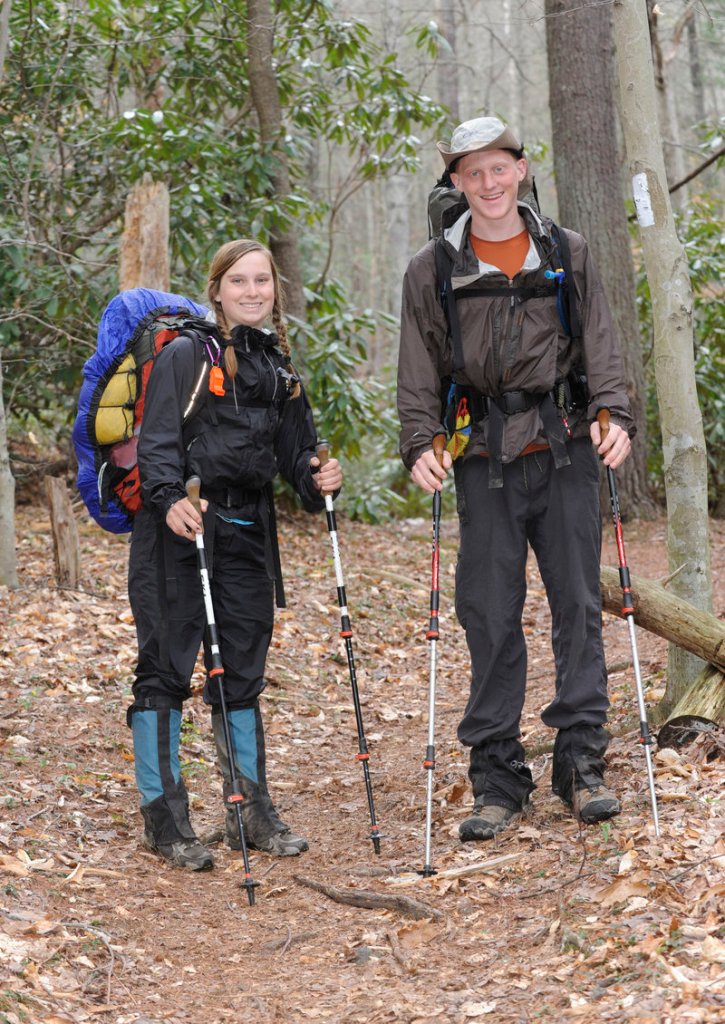DAMASCUS, Va. – Kasi Quinn bends down, picks a moth out of the mud along the trail and lets it crawl up onto the sleeve of her rain jacket.
“It looked like he was drowning,” she says, “so I got him.”
The moth flutters a bit. Then she lets it go in a drier spot nearby.
Quinn, a 20-year-old sophomore at Emory & Henry College, said she is through-hiking the Appalachian Trail to learn about life from a different perspective.
“You have to learn to love things that you hate because you have more appreciation for it,” said Quinn, whose trail name is Sunspirit. “Yes, sometimes it’s pouring down rain and you’re really cold, but I wouldn’t want to be doing anything else but hiking the trail, so I’ve learned to love the rain.”
Quinn is one of two students hiking from Georgia to Maine on the 2,181-mile trail this year as part of a new course program at Emory & Henry that builds a course of study along a five-month hike.
She and Kyle King, a 19-year-old sophomore, got back on the trail in Damascus after spending four “zero days” at school.
So far, King said, they’ve hike 464 miles.
“It’s physically demanding, but it’s also mentally demanding, so the primary reason is to explore myself on a lot deeper level,” said King, whose trail name is Zippo. “You follow the trail with your body, but your mind, you’re in this dream you have no control over what comes up in your head. You definitely can’t control the radio in your head. A song that you haven’t listened to for years will pop up and it’ll be in your head for the rest of the day.”
The “Semester-A-Trail” program is individually designed around each student, said Jim Harrison, an English instructor and director of the college’s outdoor program who also has through-hiked the trail.
Each student takes a nature writing course, a photography course, a history and geography course and a directed study project related to their major.
Quinn, a biology major, is studying how the hike affects her health along the way, Harrison said.
King, an environmental science and English major, is monitoring water quality at trailside water sources.
King said his photo project is focused on the theme of “trail magic,” or the many times that unsolicited help for hikers appears along the route.
“They’ll set out food and drink at trailheads and stuff like that, and they’ll have trail angels who will give you a ride into town,” he said. “The trail magic really is magical because you wouldn’t expect it, but it comes when you need it.”
King describes life on the trail as a strange mix of living in the present and planning down to the minute for the future in order to assure that they stay on track to finish hiking before the fall semester starts in August.
They started March 1 at Springer Mountain in Georgia and are expecting to reach Mt. Katahdin in Maine by early August.
Harrison said that before a student can take the class, he or she must first take a backpacking class, become certified in wilderness first aid and cardiopulmonary resuscitation, complete at least three outdoor program trips and be in good standing with the outdoor program as well as having a minimum 2.5 grade point average.
“(Hiking the trail) was such a huge learning experience for me that I wanted to try to help create that experience for somebody else,” Harrison said of his motivation to create the Semester-A-Trail program.
He said students had come to him saying they dreamed of hiking the trail but couldn’t take a semester off.
“I said, ‘Well, maybe we can do both,’” he said, and a program was born.
Harrison said the goal is to enable the student’s journey by preparing and supporting them along the way.
Now, he said, it’s a “marquis-type program” that says something about life at Emory & Henry, a small college that he said was very open to the idea.
Harrison said this kind of “experiential education” helps to build some aspects of a successful person, such as confidence, planning, budgeting and effective communication.
“I would rather pay to do this than be in a classroom,” Quinn said of a semester that costs just as much as one on campus.
She listed some things she’s learned so far. “The future weather means nothing because you’ll just adapt to it,” she said. “Take it one step at a time.”
Copy the Story Link
Send questions/comments to the editors.



Success. Please wait for the page to reload. If the page does not reload within 5 seconds, please refresh the page.
Enter your email and password to access comments.
Hi, to comment on stories you must . This profile is in addition to your subscription and website login.
Already have a commenting profile? .
Invalid username/password.
Please check your email to confirm and complete your registration.
Only subscribers are eligible to post comments. Please subscribe or login first for digital access. Here’s why.
Use the form below to reset your password. When you've submitted your account email, we will send an email with a reset code.